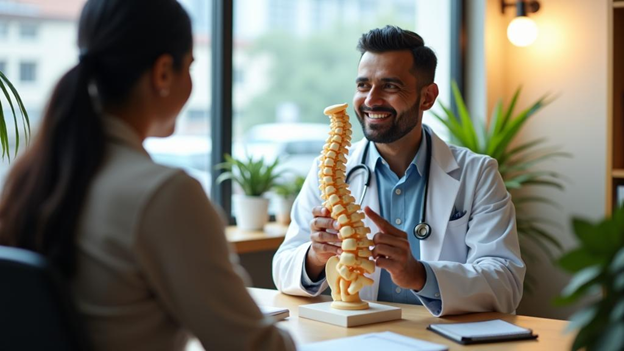A herniated disc can cause discomfort and limitations in daily life. It is a common condition affecting many people worldwide. Understanding its causes, symptoms, and treatments is crucial for prevention and management. This guide aims to simplify the complex world of herniated disc problems, making it accessible for everyone.
A Closer Look at the Spine: Anatomy & Functionality
The human spine is a marvel of engineering. It consists of several bones called vertebrae, stacked one above the other. These bones protect the spinal cord and support the head’s weight. Between each vertebra are special cushions known as discs. These spinal discs act like shock absorbers, providing flexibility and movement.
A disc is made up of a tougher outer layer and a softer gel-like center. Sometimes, due to several factors, this gel can push through the outer layer. This is what is known as a herniated disc. When a disc herniates, it can press on the nerves branching out from the spinal cord. This can cause pain and discomfort in various areas of the body. Knowing how a herniated disc impacts the spine helps one appreciate the need for proper care and attention to spinal health.
Unpacking the Causes of Herniated Discs
Several factors can lead to a herniated disc. Aging is a common reason. As we age, our discs lose their moisture, becoming less flexible and more prone to tears. Genetics also play a part, so if a close family member has disc issues, your chances of having them increase.
Lifestyle choices significantly affect spinal health. Incorrect lifting techniques, smoking, and excess weight can strain the spine. In India’s bustling lifestyle, sitting for long hours can contribute to problems. Be mindful of these factors and make healthy choices to lower your risk of this condition.
Recognizing the Symptoms of Herniated Discs
The herniated disc symptoms can vary based on the disc’s location. If the herniation is in the lumbar or lower back area, you might feel pain in the legs or buttocks. Cervical or neck area hernias may cause pain in the shoulders or arms. Additionally, numbness or tingling sensations often accompany these primary symptoms.
Watch out for early signs requiring medical attention, such as constant back pain and difficulty moving. Some commonly misunderstood herniated disc symptoms include thinking pain only arises from direct back injuries. Recognizing these symptoms early on can help you seek proper treatment sooner.
Treatment Avenues: Non-Surgical to Surgical Interventions
When it comes to treating herniated discs, there are various options. Most people initially opt for non-surgical treatments like:
- Physical therapy: This helps in strengthening the muscles around the spine.
- Hot or cold therapy: This can reduce swelling and ease pain.
- Acupuncture: This age-old practice can sometimes offer relief.
In cases where non-surgical methods are not enough, surgical options are available. Some common procedures include:
- Microdiscectomy: Removing parts of the herniated area to alleviate nerve pressure.
- Laminectomy: Removing part of the vertebra to relieve pressure.
- Artificial disc surgery: Replacing the damaged disc with an artificial one.
While exploring treatment, always consider what resources are locally available, like therapy centers or support groups.
Preventive Measures & Emotional Well-being
Preventing a herniated disc and maintaining emotional balance can greatly enhance life quality. Here are some strategies:
- Lifestyle and ergonomics: Adopt a good posture, use ergonomic furniture, and avoid prolonged sitting.
- Weight management: Maintaining a healthy weight reduces strain on the spine.
- Proper lifting techniques: Always lift with your legs, not just your back, to prevent injury.
- Quit smoking: Smoking reduces disc health, making herniation more likely.
Additionally, living with pain can affect emotional well-being. Embrace relaxation techniques, stay socially active, and seek therapy if needed. Understanding and addressing the psychological side of pain is important for a holistic approach to recovery from herniated disc problems.
Implementing these preventive measures and recognizing the importance of emotional health can make a substantial difference in managing and preventing herniated disc symptoms. Combining lifestyle changes with early diagnosis and effective treatments ensures a better quality of life for those dealing with this condition. For expert diagnosis and care for herniated discs, consider The Spine Clinic.
